|
|
|
Sort Order |
|
|
|
Items / Page
|
|
|
|
|
|
|
| Srl | Item |
| 1 |
ID:
163203
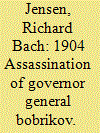

|
|
|
|
|
| Summary/Abstract |
The little-known assassination in 1904 of governor general Bobrikov, the Russian ruler of Finland, by the Finnish Senate clerk Eugen Schauman can be explained as an act of tyrannicide, anarchism, or terrorism. The article analyzes the question of which category this deed fits into and discusses the local and international background of one of the most significant acts of violence in Nordic history. It also postulates that around the time of Bobrikov’s murder in 1904 a fundamental shift occurred in the usage of the term “terrorism,” which began to replace “anarchism” as the standard signifier for violent crimes against civilization as well as against specific political grievances and institutions.
|
|
|
|
|
|
|
|
|
|
|
|
|
|
|
|
| 2 |
ID:
077612
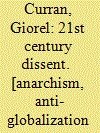

|
|
|
|
|
| Publication |
Hampshire, Palgrave Macmillan, 2006.
|
| Description |
xi, 251p.
|
| Standard Number |
9781403948816
|
|
|
|
|
|
|
|
|
|
|
|
Copies: C:1/I:0,R:0,Q:0
Circulation
| Accession# | Call# | Current Location | Status | Policy | Location |
| 052371 | 303.484/CUR 052371 | Main | On Shelf | General | |
|
|
|
|
| 3 |
ID:
124389
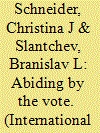

|
|
|
|
|
| Publication |
2013.
|
| Summary/Abstract |
We analyze institutional solutions to international cooperation when actors have heterogeneous preferences over the desirability of the action and split into supporters and opponents, all of whom can spend resources toward their preferred outcome. We study how actors can communicate their preferences through voting when they are not bound either by their own vote or the outcome of the collective vote. We identify two organizational types with endogenous coercive enforcement and find that neither is unambiguously preferable. Like the solutions to the traditional Prisoners' Dilemma these forms require long shadows of the future to sustain. We then show that cooperation can be sustained through a noncoercive organization where actors delegate execution to an agent. Even though this institution is costlier, it does not require any expertise by the agent and is independent of the shadow of the future, and thus is implementable when the others are not
|
|
|
|
|
|
|
|
|
|
|
|
|
|
|
|
| 4 |
ID:
083818
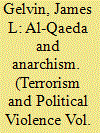

|
|
|
|
|
| Publication |
2008.
|
| Summary/Abstract |
This article situates al-Qaeda and similar jihadi movements within the category of anarchism. In so doing, it challenges the central pillar of the terrorology paradigm: the notion that terrorism is useful as an independent unit of analysis. The article takes a two-fold approach; in the first part, it offers a five-part definition of anarchism, based on the literature in the fields of history, political science, and sociology. Anarchism is distinguished by five characteristics: First, anarchism is an episodic discourse which provides its adherents with a prescription for action and which has been consistently available to, but only sometimes adopted by, political actors in the modern world. Second, anarchism makes for itself the claim of being defensive in nature. Third, anarchism is anti-systemic; i.e., the target of anarchist grievances is the very system (the nation-state system, capitalism) anarchists view as the source of oppression. Fourth, by "othering" the source of oppression, anarchists delineate, either implicitly or explicitly, an ideal counter-community. Finally, unlike the disarticulated domain of, for example, scientific socialism, the discursive field of anarchism draws heavily from the specific cultural milieu from which it springs. The second part of the article examines al-Qaeda and similar movements in terms of these five characteristics, contrasts al-Qaeda with other organizations (Hamas, Hizbullah) which have often been conflated with al-Qaeda under the terrorist rubric, and argues that, based on those characteristics, al-Qaeda does not represent a new or sui generis phenomenon, but rather fits squarely into the anarchist mold.
|
|
|
|
|
|
|
|
|
|
|
|
|
|
|
|
| 5 |
ID:
139995
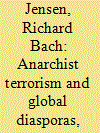

|
|
|
|
|
| Summary/Abstract |
During the quarter century before the First World War, anarchist terrorism was often blamed on the impact of anarchist agitators on naïve immigrants. This article seeks to investigate the truth of this claim, focusing particularly on Italian emigrants, but also looking at some examples of Spanish, French, and Russian emigrants. My conclusion is that, with a few exceptions, radicals emigrated, but emigration did not create radical terrorists. A particularly good example of this can be found by examining the large Italian emigration to Argentina. At most, the emigrant experience may have heightened a pre-existing radicalism or given more precise configuration to its violent expression.
|
|
|
|
|
|
|
|
|
|
|
|
|
|
|
|
| 6 |
ID:
029722
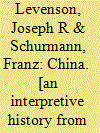

|
|
|
|
|
| Publication |
Berkeley, University of California Press, 1969.
|
| Description |
xi, 141p.hbk
|
|
|
|
|
|
|
|
|
|
|
|
Copies: C:1/I:0,R:0,Q:0
Circulation
| Accession# | Call# | Current Location | Status | Policy | Location |
| 006072 | 951.01/LEV 006072 | Main | On Shelf | General | |
|
|
|
|
| 7 |
ID:
083819
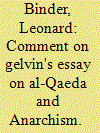

|
|
|
| 8 |
ID:
143860
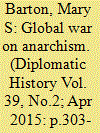

|
|
|
|
|
| Summary/Abstract |
Two decades before the assassination of Austrian Archduke Franz Ferdinand in June 1914 sparked the First World War, a wave of anarchist terrorism had taken the lives of seven heads of state in Russia, Europe, and the United States, and caused hundreds of civilian causalities. In response to these attacks, continental European governments called for collective action against the common danger. Despite European overtures for American involvement in an anti-anarchist league, particularly after President William McKinley’s assassination by a self-proclaimed anarchist in 1901, U.S. policy makers rejected collective, multilateral action with European governments in favor of a unilateral, nationalized response through exclusionary immigration legislation. The Immigration Act of 1903, America’s first encounter with modern terrorism set significant legal precedent, orienting the United States away from international cooperation and toward domestic policies of exclusion and deportation.
|
|
|
|
|
|
|
|
|
|
|
|
|
|
|
|
| 9 |
ID:
110216
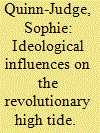

|
|
|
|
|
| Publication |
2011.
|
| Summary/Abstract |
Over the years, Hanoi historians have presented different views of the role of communist organizers in the events of 1930-31. Thanks to the opening of the Comintern archives, we can now see that in 1929-30 there was a strong shift in international communism towards revolutionary violence in all parts of the world. This paper discusses the ideological precedents and influences reaching Vietnam from Russia and the Comintern, as well as from the Chinese revolutionary movement. These include the slogans and political analysis of colonial countries that the Comintern and its agents were popularizing in Moscow, Paris and China. They also include the experience of peasant revolt in southern China, in particular what became known as the Hai-lufeng Soviets in Guangdong province in 1927-28, as well as Chinese left-wing politics of 1928-30, when Li Lisan was a dominant force. The author explores the idea that violent anarchism, with roots in the theories of early Russian revolutionaries, may have been a link between these disparate influences. An examination of the attitudes expressed by different Vietnamese communist leaders towards the revolutionary violence of 1930-31 forms an important part of this paper. To what extent were they in tune with the Comintern? Did they find other sources of inspiration closer to home? Were they simply riding a wave of peasant anger? In conclusion, the author discusses conceptions of what the Revolutionary High Tide represented in terms of political change in Vietnam. Was it the coming of age of the proletariat; an expression of peasant grievances that got out of control; or a first step on the path to independence?
|
|
|
|
|
|
|
|
|
|
|
|
|
|
|
|
| 10 |
ID:
087355
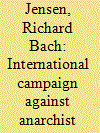

|
|
|
|
|
| Publication |
2009.
|
| Summary/Abstract |
This essay presents a short overview of the "classic" era of anarchist terrorism between 1880 and World War I, while concentrating on an analysis of the little-known efforts by diplomats, politicians, and the police to control and repress anarchist terrorism. These efforts included the Rome Anti-Anarchist Conference of 1898 and the St. Petersburg Protocol of 1904. Before World War I, a combination of economic, social, and political factors, combined with a systematic government effort to redefine and downplay the nature and importance of anarchist terrorism provides the best explanation for why this form of violence declined in certain countries but not in others. Careful police intelligence work and international police cooperation, together with a more rigorously professional system of protection for monarchs and heads of state, could aid in reducing the problem of anarchist terrorism, but heavy-handed repression only worsened it. The essay concludes with a sketch of anarchist terrorism after 1914 and a brief comparison between present-day terrorism and its nineteenth-century predecessor.
|
|
|
|
|
|
|
|
|
|
|
|
|
|
|
|
| 11 |
ID:
142191
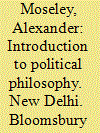

|
|
|
|
|
| Publication |
New Delhi, Bloomsbury Publishing India, 2016.
|
| Description |
202p.pbk
|
| Standard Number |
9789385436970
|
|
|
|
|
|
|
|
|
|
|
|
Copies: C:1/I:0,R:0,Q:0
Circulation
| Accession# | Call# | Current Location | Status | Policy | Location |
| 058397 | 320.01/MOS 058397 | Main | On Shelf | General | |
|
|
|
|
| 12 |
ID:
132365
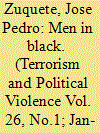

|
|
|
|
|
| Publication |
2014.
|
| Summary/Abstract |
Since the turn of the millennium in particular, protest movements have often been characterized by Black Bloc tactics of confrontation and street fighting between anarchist militants and police forces. This article analyses the Black Bloc's philosophy, dynamics, organization, praxis, and goals. After discussing the relationship between the Black Bloc and violence, the article analyses dynamics within militant anarchism that open the way for the formation of autonomous terrorist cells, as well as the potential for lone wolf terrorism in the movement.
|
|
|
|
|
|
|
|
|
|
|
|
|
|
|
|
| 13 |
ID:
098673
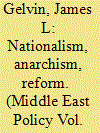

|
|
|
| 14 |
ID:
098718
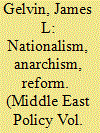

|
|
|
| 15 |
ID:
113272
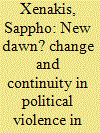

|
|
|
|
|
| Publication |
2012.
|
| Summary/Abstract |
With the arrest and conviction of members of the Greek Revolutionary Organization 17 November in the early 2000s, the chapter appeared to be closing on one of the last of a generation of urban guerrillas in Western Europe. Before the end of that decade, however, not only had a new batch of violent political organizations arisen in Greece, but the country had also experienced its worst social unrest in over thirty years. With a view to helping fill an emerging descriptive and analytical gap, this article summarizes key features of political violence in Greece between 1974 and 2011, and highlights the importance of three factors to explaining the resumption of organized political violence in the 2000s: the socio-economic environment, the treatment of radical demands by the political system, and the dynamics of violence between the state and non-state groups. In so doing, the article includes an unprecedented account of the role of the state and far-right organizations in the escalation of political violence in Greece. The article goes on to critically review expert, political, and media accounts of the evolution of political violence in the country, and concludes by considering pertinent policy implications.
|
|
|
|
|
|
|
|
|
|
|
|
|
|
|
|
| 16 |
ID:
165072
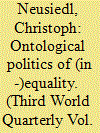

|
|
|
|
|
| Summary/Abstract |
This article aims to add a new line of research to the post-development school of thought. Drawing on the many evident yet rarely noticed parallels between post-development and (post-)anarchism, I develop an understanding of ‘anarchistic post-development’ as a politics based on what French philosopher Jacques Rancière calls ‘the presupposition of equality’. I further connect this with Arturo Escobar and Marisol De la Cadena’s concept of political ontology, suggesting that we can make sense of and analyse both contemporary ‘Development’ projects as well as anarchistic post-developmental ‘alternatives to Development’ through the lens of what I call ‘the ontological politics of (in-)equality’. To substantiate my points, I will draw on the recent case of a Mâori tribe who won a historical legal battle to declare the Whanganui River a living entity.
|
|
|
|
|
|
|
|
|
|
|
|
|
|
|
|
| 17 |
ID:
144313
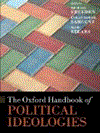

|
|
|
|
|
| Publication |
Oxford, Oxford University Press, 2015.
|
| Description |
xiii, 736p.pbk
|
| Standard Number |
9780198744337
|
|
|
|
|
|
|
|
|
|
|
|
Copies: C:1/I:0,R:1,Q:0
Circulation
| Accession# | Call# | Current Location | Status | Policy | Location |
| 058614 | 320.5/FRE 058614 | Main | On Shelf | Reference books | |
|
|
|
|
| 18 |
ID:
045347
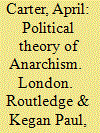

|
|
|
|
|
| Publication |
London, Routledge & Kegan Paul, 1971.
|
| Description |
vii, 118p.
|
| Standard Number |
0-10069928
|
|
|
|
|
|
|
|
|
|
|
|
Copies: C:1/I:0,R:0,Q:0
Circulation
| Accession# | Call# | Current Location | Status | Policy | Location |
| 006994 | 335.83/CAR 006994 | Main | On Shelf | General | |
|
|
|
|
| 19 |
ID:
132364
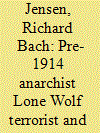

|
|
|
|
|
| Publication |
2014.
|
| Summary/Abstract |
After discussing the extent to which the period from 1878-1934, with its frequent incidents of anarchist assassinations and bombings, can be considered the classic age of "lone wolf" or leaderless terrorism, this article focuses on four acts of anarchist violence and police and government responses to this violence. The four cases are the 1896 bombing of a Corpus Christi procession in Barcelona, the 1901 assassination of President McKinley, a 1902 bombing in Livorno (Leghorn) Italy, and the 1912 attempted assassination of Italian King Victor Emmanuel III. Confronted by these violent acts, the authorities resorted to two basic policies that might be referred to as "micro" and "macro" approaches. The macro approach was to launch massive crackdowns, arrest hundreds if not thousands of suspects (in some cases torturing them), and pass repressive legislation limiting freedom of the press, freedom of association, and freedom of assembly in order to discover the guilty terrorists and to squelch anarchist propaganda and organized activity. The micro approach was to focus on improving the intelligence capacity of the police by modernizing and expanding it, and creating or professionalizing the protective service for government ministers and heads of state.
|
|
|
|
|
|
|
|
|
|
|
|
|
|
|
|
| 20 |
ID:
111504
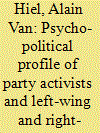

|
|
|
|
|
| Publication |
2012.
|
| Summary/Abstract |
Previous studies comparing ideological groups have been restricted to tests of between-group differences in the means of relevant political psychological variables, thereby neglecting group differences in the variances, meanings and nomological networks of the tested variables. A first exploratory study used data from the European Social Survey (N = 7,314) comparing groups of political party members on the basis of their scores on a self-placement left-right scale. The second study (N = 69) constituted an in-depth test for the presence of differences between samples of political activists of moderate parties, communists, anarchists and right-wing extremists. The results revealed that there is a fair amount of heterogeneity within left-wing and right-wing extremists, indicating a substantial amount of within-group variance of social attitudes, values and prejudice. Moreover, the extremist ideologies are best approached as distinct ideologies that cannot be reduced to extreme versions of moderate ideology, and differences in the meanings and nomological networks of the various extremist ideologies were also obtained. It is erroneous to consider members of extremist groups as being 'all alike'. The findings obtained from samples of political moderates are not a particularly solid basis for theories about extremism.
|
|
|
|
|
|
|
|
|
|
|
|
|
|
|
|
|
|
|
|
|